IN THIS ISSUE
- Letter from our Executive Director
- Issue Brief: Training for Prosperity: Transforming Workers and Communities from Poverty to Self-Reliance
- Organization Profile: Dalberg Advisors: Global Perspectives Rooted in Local Realities
- Goalmaker: Greg Nelson, Chief Technology Officer, Opportunity International
- Welcome New Members
- GlobalWA Member Events
- Career Center
- GlobalWA Events
Letter from our Executive Director
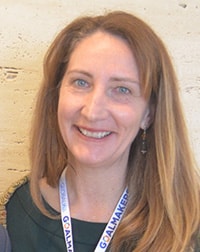
Sustainable Development Goal 8 aims to create lasting, inclusive economic prosperity and decent jobs for everyone. Achieving this goal advances other important goals, such as reducing poverty, improving quality education, and creating sustainable cities and communities. However, we are not on track with creating sustained economic growth in many countries around the world. We are at a moment of time to prepare for the future and train youth in jobs that will provide a decent wage and allow communities to thrive.
GlobalWA members are addressing barriers to economic growth on various levels, including skill development, investments in entrepreneurs, and community support. Reaching full and productive employment for all is the primary aim of SDG 8 and our GlobalWA members are working with partners to achieve this goal. Read more about this work in this month’s issue campaign.
Technology is often essential in preparing for future jobs, both in the Global South and in the U.S. Our GlobalWA members are starting to use Artificial Intelligence (AI) to enhance their ability to deliver services. GlobalWA will have a members-only event in October about AI and one of our keynote speakers at our Goalmakers Annual Conference will address this issue. We will email members more information about the October event soon and registration for the annual conference is open to all. You can register for our Goalmakers conference here. We hope you can join the conversation.

Kristen Dailey
Executive Director
Issue Brief
Training for Prosperity: Transforming Workers and Communities from Poverty to Self-Reliance
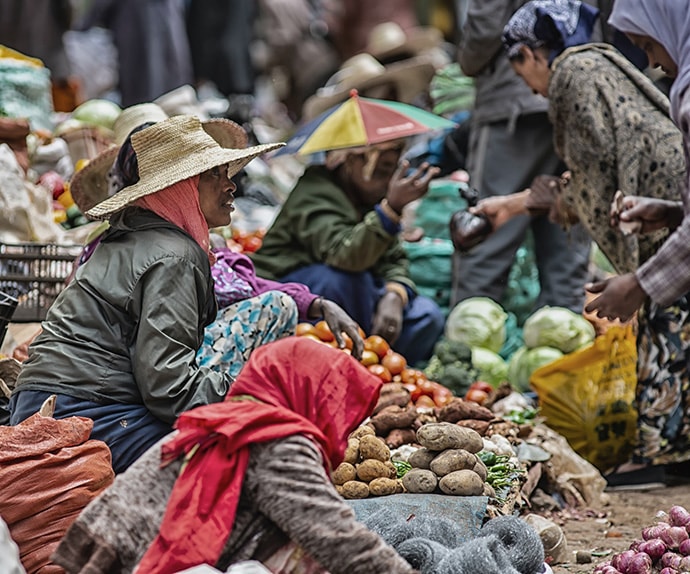
Ethiopian farmers at market. Photo: Erik Hathaway/Unsplash
By Aneesh Chatterjee
Building a system of sustainable economic prosperity and employment opportunities afforded to all, the core of Sustainable Development Goal 8, is a process designed to impact other sectors of development in tandem – such as the alleviation of poverty, the promise of Goal 1. With global unemployment projected to reach 208 million in 2023, alongside accelerating costs of living, solutions that empower workers with skills and opportunities can not only address the goal of sustainable economic growth, but actively raise underprivileged groups out of poverty.
2021 insights revealed by Our World in Data’s SDG Tracker show that on a global scale, despite recorded annual growth rates in GDP per capita across many nations, the annual changes in real GDP per employed individual – a measure of how well a country’s resources are being utilized by their labor force to maximize productivity – shows mixed results, with more instances of reduction in some countries. The Tracker also reveals rising unemployment rates, even in countries that reported substantial growth in their GDP. The effective utilization of the world’s workforce remains one of the greatest roadblocks – and opportunities – for enterprises seeking to manifest the tenets of SDG 8 and opens pathways to escape poverty.
GlobalWA members display steadfast innovation and care in their strategies to build systems of economic success, starting with people themselves.
Training the Future: Skills Development Vital for Goal 8
Members have built high-impact enterprises to deliver solutions across a myriad of sectors and focus areas. A common priority is providing people around the world with the high-demand skills and entrepreneurial flexibility that economic prosperity demands. Across sectors, our members have prioritized the inculcation of valuable skills, and the pursuit of connecting people with resources, as powerful forces of change in economically underprivileged communities.
Microsoft, supporting over 250 nonprofit organizations worldwide, addresses the goals of SDG 8 through high-value skills training, STEM platforms for developing solutions to crises, investing in digital infrastructure, promoting workers’ rights through social accountability, and joining forces with impactful partners to maximize efforts toward economic resilience.

Microsoft’s Skills for Jobs program aims to teach digital sector skills to nearly 10 million people by 2025, partnered with the African Development Bank to train local labor forces and enable them greater career flexibility. With up to 220,000 youth having benefited from training, the enterprise also offers a Digital Ambassador program with 500 trainees. Beyond Skills for Jobs, Microsoft partners with UNESCO alongside other contributors to facilitate the Global Skills Academy, an enterprise that provides vocational and technical training across 150 countries, in an effort to provide millions of potential graduates with opportunities in education, employment, and financial freedom. The Academy aims to equip large sections of the global workforce with skills fit for a more sustainable, diverse and robust global economy by 2029. Other training initiatives supported by Microsoft, such as the i.c.stars initiative to provide low-income adults with skills and education in tech-oriented career fields, and the gener8tor program, providing digital skills training to low-income people of color across the US, exemplify Microsoft’s dedication to inculcating a resilient and adaptable workforce across nations and sectors. Involved in 40 partnerships to deliver education and training resources, Microsoft works alongside other enterprises to fortify the capacities of governments in enabling access to learning resources for local communities.
While organizations like Microsoft work through motivated partnerships to support a plethora of cross-sector initiatives, other members adopt specialized focuses in select industries to maximize their impact and engage intimately with the communities in their target regions.
Transformative Education: Specialized Approaches
One organization working to develop economic resilience at the individual level is the S M Sehgal Foundation. Focused on developing the agriculture sector, Sehgal’s diverse considerations span across water infrastructure, community engagement, crop technologies and beyond. Through engagement and training in 2,061 villages across India, Sehgal directs communities and individuals, not just away from financial struggle, but toward long-term economic prosperity.

Reaching people in communities isolated from resource access and encouraging greater participation in local infrastructure is one strategy deployed by Sehgal. Their Local Participation and Sustainability Program aims to build the foundations of economic resilience and autonomy in rural communities in India by engaging directly with locals and connecting them with regional agencies and government programs that they may not be aware of, enabling them access to resources otherwise unreachable. With an additional, specialized focus on empowering women in these communities, the program provides a discourse platform for women to bring up and address community issues, learn valuable leadership and communication skills and become more autonomous in their abilities to access resources and government services.
Sehgal’s Agriculture Development Program promotes capacity-building; by training farmers to develop their income streams through diverse entrepreneurship skills, locals are taught to implement more lucrative business models, build resilience through food security measures, and introduced to more effective cultivating techniques for greater yield and subsequent income. Field demonstration sessions are conducted to train farmers first-hand on the benefits of pesticide control, soil testing, seed-sowing, biofuel usage, and other sustainable practices designed to mitigate risk and maximize potential yields.
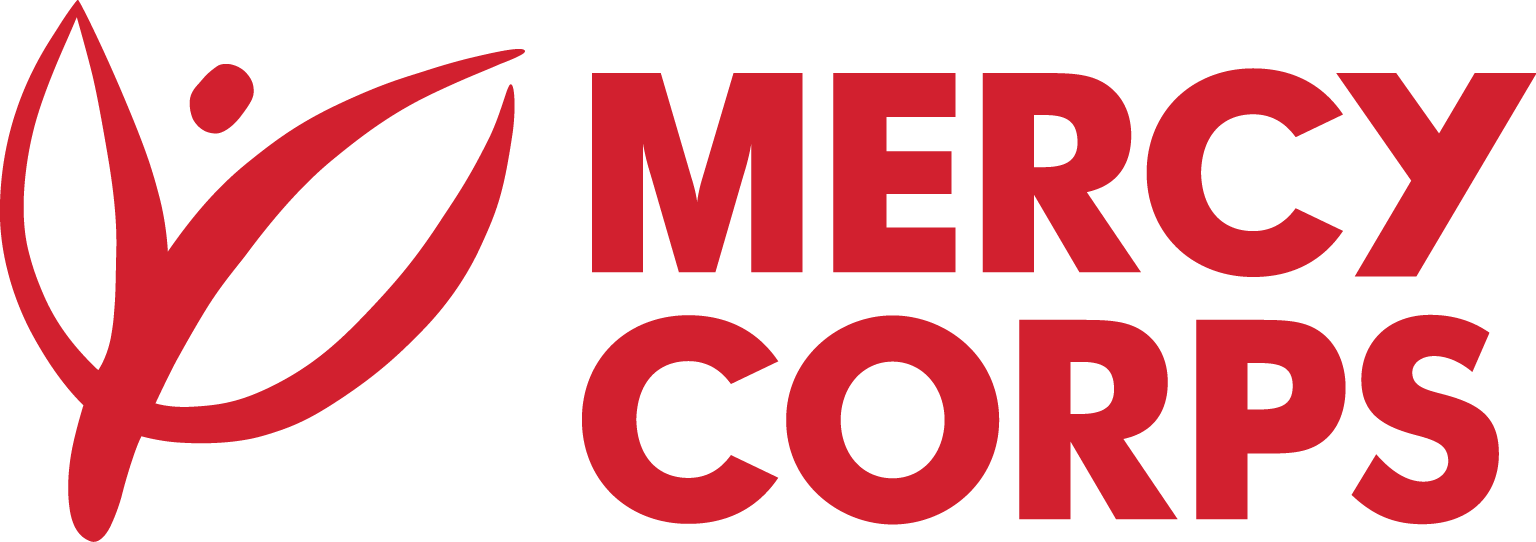
For Mercy Corps, access to training and resources is equally critical for personal growth and economic stability. The Gaza Sky Geeks program, funded by USAID and established by Mercy Corps, grants a platform for tech sector skills development and education in Palestine, working toward sustainable and prosperous career opportunities for Palestinian youth. Gaza Sky Geeks offers comprehensive coding courses, freelancing opportunities, digital marketing training and a startup incubator program, leading to substantially increased access to economic growth: a cumulative $5 million in earnings reported by program graduates, and a 99% success rate for program-trained job applicants.

Building financial resilience in the Pacific Islands is Rise Beyond the Reef, through their Traditional Contemporary Arts & Crafts Program. By helping women and girls generate income from traditional artisan products, especially those in particularly isolated communities, the program connects skilled workers with reliable markets, teaches leadership and autonomy, and builds financial independence for women facing gender-based marginalization in the realm of income opportunities. Operating across nine islands, the program offers a viable alternative source of income for families dependent on traditional agriculture; with goods ranging from handmade jewelry to canvas prints, home decor, clothing and a myriad of other artisan products, crafters now have access to tourist markets.
The Arts & Crafts Program pays workers at rates between 55-65% of Fiji’s minimum wage, working to ensure that cash transfers are handed over individually, tracked with receipts and remain consistently inclusive of labor costs and raw material expenses. Beyond paying workers, the program invests in every area of the supply chain: training workshops for villagers, production equipment, product development consulting, marketing for artisan goods (including paid social media ad campaigns), reliable tagging and shipping of orders, and subsidized transportation of products to relevant markets. Rise Beyond the Reef exemplifies comprehensive and culture-conscious economic empowerment, building reliable systems for long-term financial prosperity.
The Hunger Project (THP), founded to free struggling regions from poverty and starvation, conducts high-impact interventions to grow the financial capacities of individuals and communities. Operating in 12 countries across Africa, South Asia and South America, projects focused on the poverty crisis prioritize women for skills training and connect them with credit sources, building up their abilities to stimulate local economies. Novel income streams like sewing and cow-fattening are introduced to help diversify cash flow, providing workers with tangible routes to alleviate financial burdens.
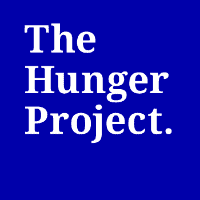
In tandem with capacity-building for labor forces, members acknowledge the importance of technology in transforming a workforce. For a more sustainable and dynamic global economy in the near future, training the workforce with adaptive technologies in mind is proven essential by GlobalWA members.
Versatile Technology: Adapting through Barriers
Understanding that economic prosperity demands that solutions be adapted to the capabilities of digitization, financial inclusion is another development priority for Mercy Corps. With over 1.7 billion adults in the world without legitimate bank accounts, Mercy Corps recognizes the value of technology in connecting people to valuable financial resources – particularly when increasing access to banking services has correlated with reductions in dire poverty. A study of financial inclusion tactics in Jordan brought to light the JoMoPay (Jordan Mobile Payments) Mobile Wallet, a method of connecting Jordan’s population – over 60% of which is unbanked – with formal financial services, legitimizing their incomes and increasing resource accessibility. Mobile wallet alternatives have also been deployed in Syria, where they’ve helped to bridge the separation of traditional financial freedom from marginalized groups.
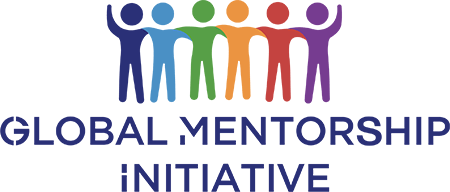
Incorporating training with technological innovation is the Global Mentorship Initiative. Their fully remote mentorship program, accessible worldwide, connects students with industry professionals to foster versatile, transferrable soft skills across multiple sectors, generating a talented and adaptable workforce. With a 76% success rate for students finding employment after graduating the program, a large number of testimonials from past students demonstrate the value of the program, both in the realms of career success and personal development.
In the realm of education, a similar project is Mercy Corps’ MicroMentor. A platform connecting upcoming entrepreneurs with volunteer mentors, MicroMentor facilitates vital access to assistance with business development and helps mentees implement and grow their enterprise effectively – a venture with resounding success, according to their 2022 Impact Report. By partnering with Verizon Small Business Digital Ready and Grab Indonesia, MicroMentor has attracted 95,000 new entrepreneurs and 21,000 mentors in 2022. By partnering with Grab, a mobile app providing versatile services, MicroMentor was able to reach over 9 million users in Indonesia with opportunities to develop their trade and access entrepreneurial possibilities. Their partnership with Verizon also helped them reach over 140,000 prospective and established entrepreneurs in the US. As of 2023, the platform is the recipient of a $1 million grant from Google.org, with full-time developmental support to build MicroMentor’s first proprietary mobile app, enabling unparalleled access to millions of users across the world.
The aforementioned Agriculture Development Program by the S M Sehgal Foundation also develops agricultural practices through technology. With subsidized prices, farmers are provided machines that can reduce manual labor input, increase reliable consistency in yield and performance, and eliminate uncertainties. Farmers are trained on safe machine operation and encouraged to develop their income by renting out machines as well.
Other members have developed resilient and innovative products to fortify communities. The Talking Book, developed by Ampilo, is a robust device built to deliver educational content to remote regions, providing people with vital opportunities for literacy. A cost-free option with hours of audio content in multiple languages, Ampilo’s product breaks barriers to education access for underprivileged groups.

While some members use industry-leading technology solutions for delivering training and education to labor forces, others prioritize developing the regional infrastructure of target communities to be legitimized, well-represented and best-equipped for the future economy.
Philanthropy and Representation: Legitimizing Infrastructure
Infrastructure development is a key priority of the S M Seghal Foundation. Through the empowerment of farmer-producer organizations, Sehgal promotes stronger, more reliable access for farmers to credit, supply chain management, resources and technologies that ensure the most fruitful output. Beyond finances, Sehgal trains farmers on water conservation through multiple practices, ascertaining an approximate reduction in water consumption by up to 85% in some communities – a vital improvement in regions where water scarcity poses a crippling challenge to basic infrastructure.
Adopting a similar strategy, the Rural and Agricultural Finance Program (RAFiP) by The Hunger Project, successfully completed in Ghana in 2017, empowered rural workers with access to micro-financing and built representational legitimacy by organizing farmer groups into cooperatives. The program organized 60 cooperatives, connected 876 people with bank loans and facilitated training on agricultural methods and microfinancing for 14,774 farmers. The infrastructure of community banks were fortified with software upgrades and computers, and 22 credit unions were legitimized through registration with the Credit Union Association of Ghana.
Beyond legitimizing workers through cooperatives, THP also prioritizes the inculcation of independence. Their Epicenter Strategy seeks to empower communities by inculcating sustainable self-reliance, implemented in nine African countries. By prioritizing the empowerment of women, encouraging collective effort and fostering connections with local governments, a community’s transformation toward self-reliance is measured through comprehensive data collection and evaluation of set indicators. Established THP epicenters provide progress reports that demonstrate a community’s efforts to meet specific targets, ensuring data transparency with regular community meetings. Since the establishment of the strategy in 2008, 68 epicenters across Africa have met the criteria for self-reliance and economic independence.
Another organization taking on broad sector development to drive economic growth is the Ventures initiative by Mercy Corps. Aimed to support and scale startups with capacities to benefit up to 3.3 billion disadvantaged people, Ventures has raised nearly $400 million for 43 startup enterprises since 2015, focused on building resilience for at-risk communities across a variety of developmental sectors – including agriculture, climate-smart technology, finance and food security. Bypassing traditional roadblocks to financial support, Ventures adopts decentralized cryptocurrency distribution with partner companies to ensure that recipients receive the funding they need.
A product of Mercy Corps’ Resilient Future Thesis, the Ventures program sees the climate-driven disruption of conventional systems of operation as a nascent opportunity to restructure processes into more sustainable methods, growing cross-sector resilience for a future certain to face the increasing complexities of climate change. By investing in sustainability-focused startup enterprises, Mercy Corps encourages further growth in climate-conscious industrialization, enables financial flexibility for new organizations in underdeveloped regions, and grants individuals the economic freedom to not only grow out of financial struggle, but apply their skills to further the development of their respective communities. Fund II, the next Ventures initiative, aims to invest in 30 startups working to develop resilience against climate change.

Utilizing the same approach is Capria, an investment enterprise working to stimulate entrepreneurship in the Global South. The Capria Ventures Global South Fund II aims to assist 20-25 startups across cities in India, Indonesia, Nigeria, Vietnam, Brazil, Mexico and Kenya, reaching close to their funding target of $100 million. Focusing on a broad range of sectors from climate development to fintech, logistics and healthcare, Capria’s beneficiaries will incorporate artificial intelligence to fortify their operations.
GlobalWA members demonstrate the value of approaching issues at every level of engagement – from multi-sector philanthropic partnerships, to industry-specific skills development and community legitimization. Understanding the requirements for Goal 8, organizations have prioritized the inculcation of in-demand skills, the unhindered access to education and mentorship, opening routes to funding opportunities to encourage entrepreneurship, and encouraging enterprises to adopt sustainable practices in every step of their mission.
In addition to the above organizations, the following GlobalWA members are working on SDG 1 No Poverty and SDG 8 Decent Work through their programs in communities where they work.
No poverty? Big scope, yet our partners have been working on this topic in Goma, eastern DRC, for twenty-plus years. Poverty is related to cultural practices, to land tenure, to education, to government, to a justice system based on rule of law, to peace–or lack of any of it. Goma has been an epicenter of conflict since 1992, off and on.
Our partners have targeted specific groups over the years: women with fistula, teen moms, domestic workers, internally displaced people. They have developed a team and integrated approach that begins with individuals being listened to, recognizing their own trauma, and growing a new community by being in a support group. It takes time to develop trust. Information is introduced gradually: how to prevent disease, sexual and reproductive health, small business practices, literacy, vocational training, saving circles that grow into credit/loan associations.
ACT for Congo accompanies our partners as they define and carry out their own vision for their community in Congo—Goma and Beni, in ways that respect individuals, encourage peace, and develop capacities in people to support themselves and their families. Our collaborations foster health, empower women and cultivate community.
Fundación Future of Fish Chile (FoF Chile) works to elevate convenience and innovation within the responsible seafood movement while “achieving higher levels of economic productivity through diversification” (SDG 8) in Chilean caletas, or small-scale fishing communities. When initiating work in a community, FoF Chile conducts extensive research to better understand the target fishery, with much emphasis placed on identifying and building alliances with local stakeholders in the region’s artisanal fishing sector. Through these partnerships, several tenets of SDG 8 are also advanced such as promoting formalization, a focus on value-added products, and the broader decoupling of economic growth from environmental degradation.
In this way, fisherfolk, aquatic food harvesters, and divers from different parts of Chile are encouraged to venture into responsible fishing— generating locally sourced value-added products, creating their own alternative markets, and identifying new and innovative ways to reach clientele. FoF Chile simply facilitates the stakeholders’ ideas and ensures that project specifications are in line with the principles of responsible fishing—that no IUU fishing takes place and that their harvest methods generate the least possible ecological impact. Equally important to FoF Chile’s work is promoting positive social outcomes, such as providing a fair income and advancing formal and transparent seafood trade throughout the value chain, including logistics, marketing, and gastronomic services. FoF Chile also believes that making stories visible to consumers, through storied fish with accessible technologies, our efforts are brought full circle and increase the growing movement of responsible seafood production and consumption throughout Chile.
Give2Asia’s steadfast commitment to poverty reduction is undeniable. Since 2001, they’ve channeled over US$535 million to empower 2,500 local charities in 30+ countries. Give2Asia grants span myriad facets of poverty alleviation, from supporting disadvantaged women in India with entrepreneurship opportunities to enhancing early childhood education in rural China to promoting sustainable natural resource management to livelihood farmers in Cambodia. Moreover, Give2Asia’s DisasterLink program, spanning 20 disaster-prone locations, unites more than 50 pre-positioned community-based organizations to support the most vulnerable populations when disaster strikes and promote disaster preparedness and resiliency.
GMI prepares underserved students and refugees to get their first job after graduation. This is accomplished through a structured, short-term, online mentorship with a business professional enhanced through the power of AI.
GMI has over 9,000 students and mentors registered, and we partner with 45 universities and youth associations in 92 countries. In 2024, GMI will add over 5,000 new students for mentorship. Microsoft has provided more than 700 mentors for the GMI program in the past year.
The mentorship program is designed to make it easy to be a great mentor without a significant time commitment. And it’s built to give students a consistent, high-quality experience.
Students learn how to present themselves to the business world, how to speak with confidence, and they are building a business network through LinkedIn. They learn how to set smart goals for their careers and how to think like a job recruiter.
GMI’s mentorship program introduces AI to graduating students to use in all stages of their job search. This includes preparing their resume/CV, building their LinkedIn profile, communicating with job recruiters, and interview preparation.
Global Partnerships (GP) is an impact-first investment fund manager dedicated to expanding opportunity for people living in poverty. Since GP’s founding in 1994 and the launch of its first fund in 2005, GP and its affiliated funds have invested in sustainable solutions that empower people to earn a living, provide basic necessities for their families, and improve their lives.
The investments aim to deliver clear and compelling impact in four dimensions:
- Broadening opportunity across different facets of poverty including, but not limited to, economic opportunity, education, energy, health, housing, sanitation, and water.
- Deepening inclusion of poorer and underserved people, including women and the rural poor.
- Serving millions through sustainable and scalable solutions that can positively impact the lives of millions of people.
- Improving lives by empowering people to earn a living and meet their basic needs.
GP does this while seeking to preserve capital with a modest financial return for all fund investors.
The SG Foundation has always supported SDG #1 – elimination of poverty. Over time since the establishment of the SG Foundation in 1984 we have come to focus on children and education as the best means of tackling poverty. Education, of course, does not simply entail getting children into school. It means having access to clean water, nutrition, and healthcare. It also connects with SDG #8 – decent work and economic growth. Jobs and income are much needed components to not only get children to school but keep them in school. In Central America (where SG works), many families depend on children to help in the fields or household or otherwise generate income. Staying alive necessarily trumps school. SG Foundation accordingly supports non-profits that help farmers, small businesses, etc., to generate family incomes. We favor working with women who are inclined to be more enthusiastic about educating their children, but our work is not exclusively with women.
We are excited to be a part of the Global WA program where we can connect with like-minded organizations seeking to make our world a better place.
Upaya Social Ventures is building a dignified economy by providing investment and support to early-stage businesses creating sustainable livelihoods for people living in the most extreme poverty. At Upaya, we believe that dignified jobs are a human right, and that dignified work has a catalytic impact on families, communities, and economies. That’s why we invest in early-stage social enterprises that are creating safe, stable, inclusive, and rewarding job opportunities for people living in extreme poverty.
Since our founding in 2011, Upaya’s portfolio companies have created over 30,000 dignified jobs across India.
World Vision is committed to ending extreme poverty. One of the markers for positive change is World Vision’s livelihoods model, Transforming Household Resilience in Vulnerable Environments (THRIVE) in Tanzania. THRIVE is designed to equip families to lift themselves out of poverty through building improved and resilient livelihoods that enable significantly better incomes, food security, and child well-being. A recent evaluation conducted by TANGO International on this program showed significant improvements when comparing endline data (2020) to baseline data (2013).
THRIVE household annual incomes skyrocketed to a reported $1,370 a year from $138 a year— 9.93 times higher than at baseline. Families used the money to improve their children’s education, housing improvements, medical care, and investments in their businesses. 40% of families participating in THRIVE were more food secure than control households at endline. The percentage of THRIVE households reporting that they could provide for the basic needs of all children in the household increased from 46.8% at midterm to 60.2% at endline. At endline, 85.7% of THRIVE households reported they could obtain a loan if needed, compared with 13.8% at midterm. THRIVE households who engaged in on-farm natural resource management grew from 24.7% at midterm to 45% at endline.
Yemen Relief and Reconstruction Foundation
Now in its ninth year of conflict, Yemen remains the largest humanitarian crisis globally, with 24 million people out of the population of 30.5 million in need of humanitarian assistance. The conflict has left 4 million people, including 2 million children, internally displaced, and at least 500,000 public sector workers have been without salaries for over six years.
The war has exacerbated food prices for a country that imports more than three-quarters of its food needs. YRRF has multiple projects to enable poor and vulnerable families in Yemen to generate income in a sustainable way to improve their food security, self-reliance, and dignity in a time of severe deprivation. In 2022, YRRF distributed 585 sheep, 600 egg-laying hens (with 1 rooster per family), and 140 beehives. Livestock serves as a source of protein, nourishment, and income to families in need.
YRRF is currently supporting 20 girls from 3 governorates who are completing a three-year midwifery diploma. In June, YRRF provided a training course for 1,500 women and girls. This 45-day training course provided instruction in nursing and first aid, handicraft production, sewing, and hairdressing. Additionally, in January 2022, YRRF distributed 35 sewing machines to women in need and conducted sewing training.
Organization Profile
Dalberg Advisors: Global Perspectives Rooted in Local Realities
By Tyler LePard
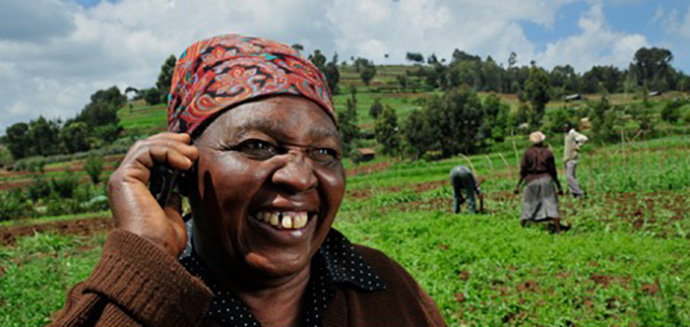
African farmer. Photo: Dalberg
Dalberg Group is “a global group of changemakers working to build a more inclusive and sustainable world where all people, everywhere, can reach their fullest potential.” Dalberg is the largest advisory firm globally dedicated to social impact, and its work with over 2,000 clients over the past two decades has spanned the waterfront of global development issues. The mission-driven firm has a deeply rooted presence in the Global South, with approximately 800 staff based in 30 offices across the world and serving clients in more than 90 countries. This gives them global perspectives that are firmly rooted in local realities.
Origin Story & Evolution
Dalberg was started in 2001 by ex-management consultants who wanted to dedicate their careers to purpose-driven work. The founders saw an opportunity to apply hypothesis-driven problem-solving processes common in the private sector to intractable issues in the global development arena. Dalberg brought data-driven strategies and a high pace of execution to decision support and strategy development to major institutions like the World Bank, United Nations, USAID and others.
Over the past two decades as the global development landscape has changed – including with the creation of major organizations like the Global Fund and GAVI, as well as the increased scope of private investment seeking opportunities in emerging markets – Dalberg has adapted its offerings. More recently, the firm’s climate practice has been busy supporting a range of clients with the development of new approaches, investments, and initiatives to address climate change across a range of country and sector contexts.
Dalberg Advisors is one of the Dalberg businesses. They are a strategic advisory firm that “combines the best of private sector strategy skills and rigorous analytical capabilities with deep knowledge and networks across emerging and frontier markets.” Dalberg works with three broad categories of clients: (1) global development institutions, (2) companies seeking to generate positive impact and growth, and (3) philanthropies and nonprofits big and small, local and global. They address sector issues like access to finance, improving access to healthcare services, and access to energy solutions that meet people where they are. They also serve clients with a functional lens such as strategy, organizational effectiveness, and finance.
No Poverty and Economic Growth
Much of Dalberg Advisors’ work relates in some way to Sustainable Development Goal (SDG) #1: No Poverty and Sustainable Development Goal #8: Decent Work and Economic Growth.
“No Poverty is SDG #1 for a reason. Poverty and the absence of economic opportunity is a fundamental driver of other issues and constraints on people’s ability to live the life they want. Economic opportunity is core to the whole development enterprise. It’s all related,” said Greg Snyders, Partner, Dalberg Advisors. “Many of the clients we’re serving are working on issues related to economic well-being across the board.”
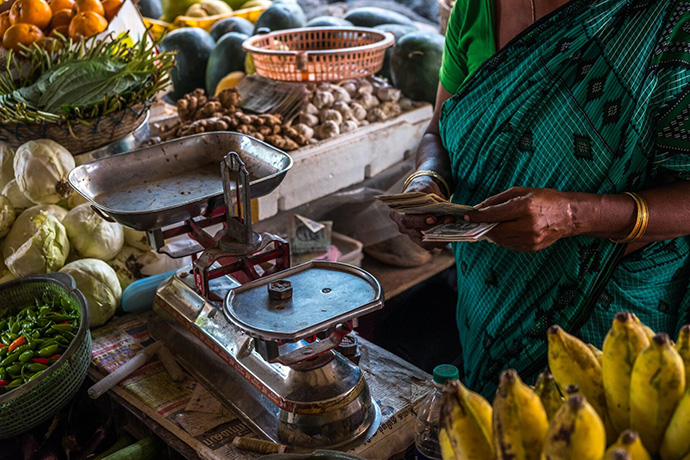
Indian businesswoman. Photo: Dalberg
Dalberg helps countries and regions develop inclusive growth agendas and programs where all people can benefit from, and participate in, economic growth.
One example focuses on decent work and economic livelihoods. Over a few years, Dalberg Advisors helped a major funder with strategy across 10 countries in Africa related to accelerating opportunities for young people and the transition from education to employment pathways. There was a significant gap between what educational institutions delivered and what the market needed. And, left unchecked, this problem would only increase. In the next 30 years, it’s estimated that the populations of more than half of Africa’s countries will double. An absence of opportunities for young people to work and to support their livelihoods creates problems for society. Within the 10 focus countries, the Dalberg team tailored the strategy for the country context and to design programs that would persist over the long term. This strategy helped the funder identify the significant issues, organize their work, and allocate resources appropriately.
Financial Inclusion
Another common issue that Dalberg works on is financial inclusion. An estimated 1.4 billion adults globally lack access to formal financial services like bank accounts. Dalberg helps clients identify opportunities to expand access and accelerate usage of financial services. This helps more people have the security and convenience of digital payments for school fees or to support relatives, rather than carrying large amounts of cash over long distances. It helps people build wealth through savings accounts. Farmers and entrepreneurs can get access to fair and lower-cost credit. Dalberg also helps their clients make sure the right market structures are in place and break down some of the digital financial barriers.
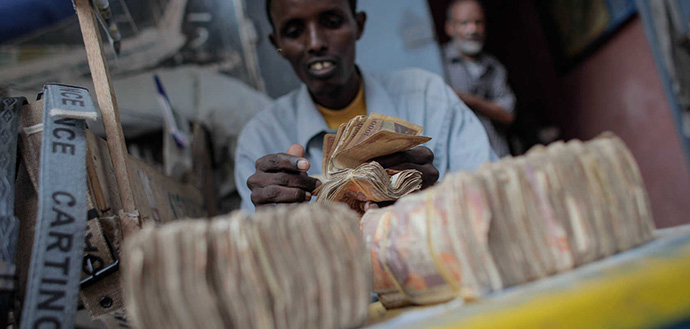
Remittances. Photo: Dalberg
Get Involved
Dalberg provides services to clients, from strategy to execution, such as providing new ways to frame problem statements, better information for decision making, and identifying new investment or programmatic opportunities.
Increasingly, Dalberg is supporting the development and co-creation of solutions and initiatives that they think would be useful for the ecosystems in which they work. “We love helping–not just supporting clients on specific problems, but we love helping groups of people to co-create new solutions that would be impactful for the world,” said Greg Snyders, Partner, Dalberg Advisors. “So many issues are cross-cutting. There’s rarely a single point of view from a sector that is going to be adequate to address the scope or scale of a problem. We encourage clients to think from a systems lens.”
Dalberg also continues to find opportunities to grow their geological footprint. They just opened an office in Vietnam. They also have a new office in Bogota, expanding their Latin America presence.
Goalmaker
Greg Nelson, Chief Technology Officer, Opportunity International
By Amber Cortes
Opportunity Knocks: Pioneering Digital Transformation with Optimism
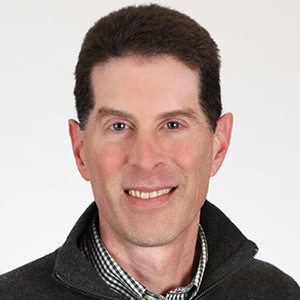 Greg Nelson spent most of his career witnessing (and participating in) historic digital transformation. Now, he’s bringing it to the global development world.
Greg Nelson spent most of his career witnessing (and participating in) historic digital transformation. Now, he’s bringing it to the global development world.
Nelson started out at Microsoft in 1995, “which was basically when the internet as we think of it was just beginning,” he says.
At Microsoft, he managed to work in almost every department of the company in a wide variety of roles: engineering, partner and business development, marketing, and sales.
But in 2020, after 26 years at Microsoft, Greg Nelson was ready to close that chapter of his career and move on to other challenges.
So he pivoted to an interest developed back when he was a Rotary Scholar in Cape Town, South Africa, working with an organization that specialized in micro lending. It was the first time he had heard of microfinance, an approach to financial inclusion started in the 1970s by founder of Grameen Bank Muhammad Yunus.
It made an impression on him.
“This is helping people create their own livelihood. You give them training, you give them a little bit of capital to start their business or run their farm, and off they go.”
After retiring from Microsoft in the middle of COVID, Nelson joined the board of Opportunity International, a nonprofit formed in 1971 to help uplift people out of poverty. Nelson wanted to bring his 26 years of experience in the tech world to help build the organization’s digital capacity across its programs and help team leaders “re-envision the ways that we deliver services to our clients and our partners.”
“But I quickly realized that, once we got through the envisioning and the initial strategy for digital transformation, we also needed to be able to operationalize it.”
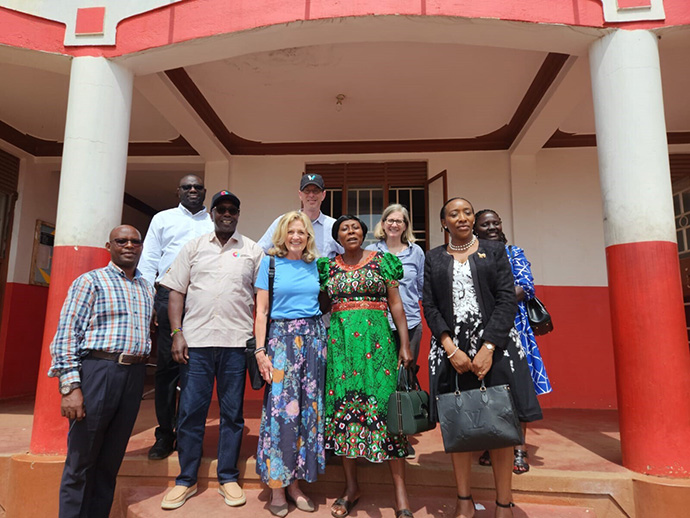
Board members visit a school in Africa. Photo: Opportunity International.
Nelson rolled up his sleeves and joined Opportunity as their new Chief Technology Officer (CTO) to jumpstart the process, help build the right team, attract donors and supporters, and get the work underway.
Nelson and his team at the Digital Innovation Group (DIG) use human-centered design, a discipline established at the Stanford Design School and firms like IDEO, to develop personas of clients that Opportunity International serves. Not just unique to tech, human-centered design can be applied to everything from architecture and healthcare to new businesses and startups.
“And I certainly believe the right way to think about the challenge—or the opportunity—is to start with the people,” says Nelson.
These personas are based on real-life research into Opportunity’s demographics. There’s Faustina—a smallholder farmer in rural Ghana with a limited educational background who owns a smartphone, and Kojo, a day laborer looking for work. Both clients, says Nelson, can benefit greatly from relatively simple and inexpensive technology that can help locate seed prices, find work at a fair rate, check the moisture and nutrient levels of soil, and more.
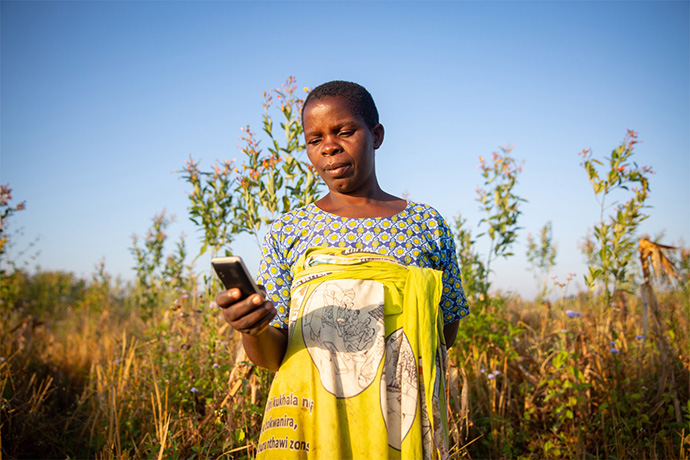
African with mobile phone. Photo: Opportunity International
When it comes to innovation as a concept, Nelson summons a quote from science fiction writer William Gibson: “the future is already here, it’s just not equally distributed.”
“It is unbelievable, even compared to five years ago, the amount of power and capability that is available to us – but also to Faustina and Kojo. And the delivery of that power is right there,” says Nelson.
“There’s no reason that a farmer in Nairobi should be farming in a fundamentally different way than a farmer in Nebraska.”
And Nelson and his team aren’t stopping there. They’re also utilizing the “game changing” power of AI to create a ChatGPT-type platform specific to the needs of Malawi farmers.
Nelson’s time at Microsoft afforded him the leeway and resources to imagine a better world and build solutions, and trained him to look at the world through a technology lens.
“And it’s a fundamentally very optimistic lens,” he adds.
Beyond the operational practices Nelson brings with him from the tech world lies something a little more intangible, but no less real, that impacts his work at Opportunity.
“The people I worked with, the teams I was on, the leaders I learned from and how I was able to help people learn and help them build their own careers, that’s the legacy from my point of view – more than all the products I shipped and all the projects that I worked on.”
To that end, Nelson has brought together a team of experts from places like Meta, Google, and Microsoft to form a Tech Advisory Council for Opportunity International to “help us find the sweet spots, where the needs of our clients and the capabilities of tech are meeting in the same place.”
Nelson acknowledges that nonprofits can have a harder time developing and executing digital transformations, compared to big tech companies where checkbooks fly open at the drop of an app.
“I mean, Microsoft’s a Big Idea Factory. It’s this amazing kind of wonderland of ideas with a huge number of resources to go chase those ideas,” Nelson says.
Even strapped-for-cash nonprofits can level up their big ideas in the fundraising game by working on their elevator pitch, and Nelson was able to hone his own elevator pitch – in an actual elevator – with elevator pitch master Steve Ballmer from Microsoft.
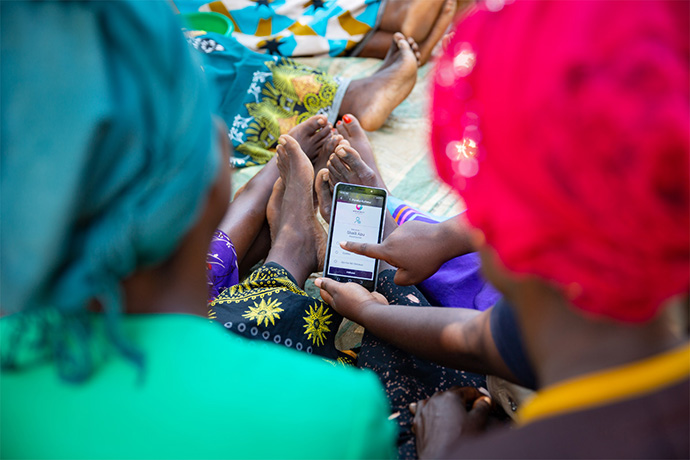
Photo: Opportunity International
“I think the ability to take a complicated challenge and idea and distill it into fifteen seconds, that’s the skill. And I think every nonprofit out there, every worthy 501c3 organization is built on some big ideas. But can you distill them down in a way that other people will want to hear and get excited about? You’re working there for a reason, you’re passionate about it. But can you engage and recruit other people into that vision?”
Another challenge that Nelson observes in the NGO world is fragmentation—a scarcity mentality of nonprofits believing they are all competing for the same resources. It’s better to see a potential partner as a potential collaborator.
“Donors will be excited by that. And then the money is going further, being spent more efficiently. You’re each bringing your own expertise, your own capabilities in a collaborative way. That’s what the donors want. I mean, I’m a donor. That’s what I want.”
Collaborating and building partnerships and bridges between people who use the SDGs as their north star is the only way, Nelson says, that the ambitious goals of the SDGs will ever be realized. And of course, bringing that sense of optimism that comes with dreaming big.
“The technology, the ability to deploy it, the ways that we can reach people, that data we can collect to drive learning loops. I’m incredibly optimistic about how we go after poverty in our lifetime.”
Welcome New Members
Please welcome our newest Global Washington members. Take a moment to familiarize yourself with their work and consider opportunities for support and collaboration!
Save Kids Trust (SKT)
SKT India provides healthcare to numerous slum communities in Jaipur India. At SKT US, we help with fundraising, web and admin support. Savekidstrust.org
Member Events
September 26: Pursuing Women’s Economic Empowerment in a Destabilized World – World Affairs Council
September 28: How Companies, Indigenous Peoples and Local Communities are Partnering to Advance Human Rights and Conserve Nature – Earthworm
September 30: Lifting Those Left Behind Benefit Dinner | The Rose International Fund for Children
October 6: Agros International: Tierras de Vida 2023
October 25: A Night In Afghanistan | Benefit for Sahar Education
Career Center
Ecosystem Services Technology Officer FSC Investments & Partnerships
Quality Assurance Consultant The Max Foundation
Program Manager – Operations The Max Foundation
Office Manager / Administrative Specialist Linksbridge
Director of Finance and Operations Seattle International Foundation
Director, Business Development Splash International
Grant Writer Splash
Communications Officer The Max Foundation
Cultural Orientation Volunteer International Rescue Committee (IRC)
Airport Pickup Volunteer International Rescue Committee (IRC)
Grants & Contracts Manager Snow Leopard Trust
Check out the GlobalWA Job Board for the latest openings.
GlobalWA Events
November 30: VIRTUAL: 2023 Goalmakers Conference
December 7: IN-PERSON: 2023 Goalmakers Conference